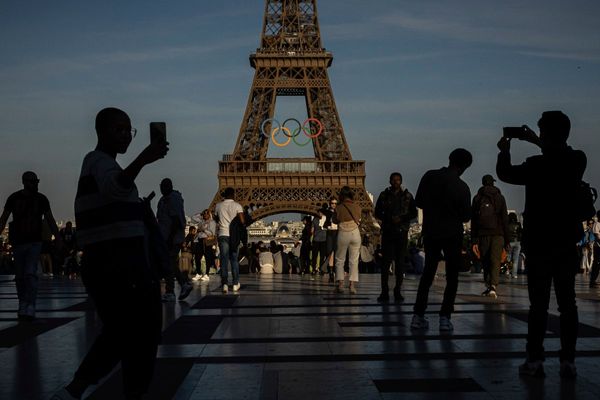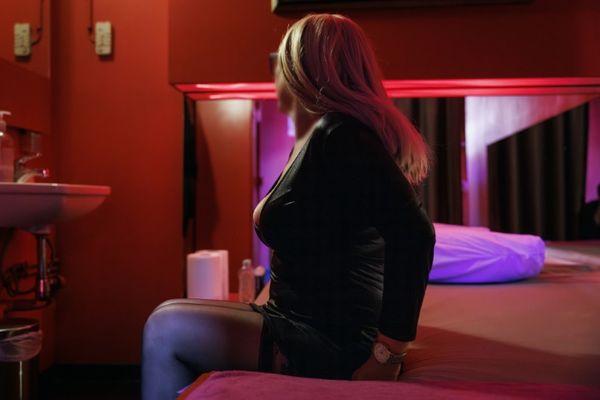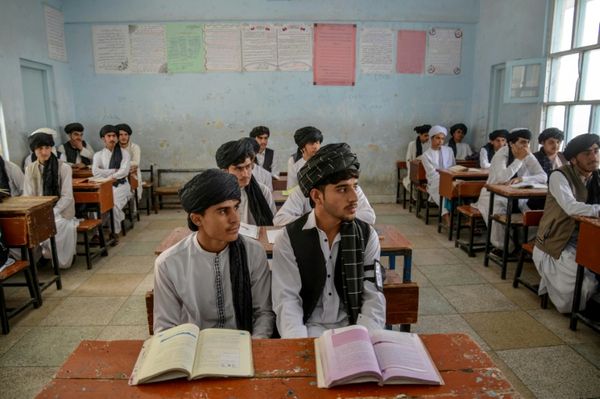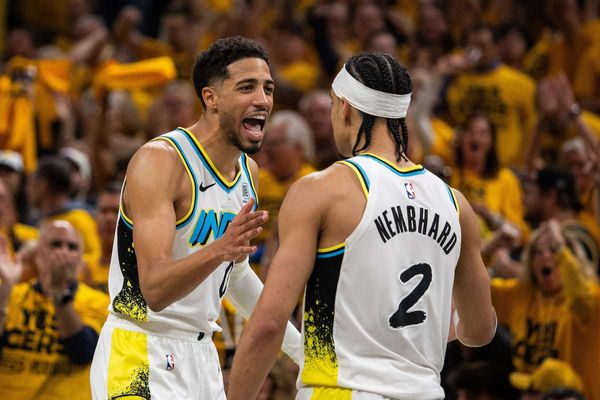
Jacob Rees-Mogg’s townhouse is a stone’s throw from the Houses of Parliament. The family nanny, Veronica Crook, greets me with a smile. Crook was Rees-Mogg’s nanny from the day he was born and is now nanny to him and his six children. There is a huge, handsome portrait of her next to the kitchen. In the large room opposite, huge handsome portraits of family members and historical figures hang on the walls.
It wouldn’t take long to work out who lives here if you were playing Through the Keyhole. The loo is plastered with newspaper cartoons about the former Conservative MP and minister, riffing on his scorn for civil servants, lockdown regulations and the EU. Then there are the cartoons celebrating his image as Mr Nasty: Rees-Mogg as a bespectacled cat saying: “I wouldn’t hurt a fly” while his left front paw pins down a petrified mouse; with a baby Boris Johnson in his arms, as a spitting Theresa May says: “Your daddy is a horrible person!” Rees-Mogg, 55, is famous for floccinaucinihilipilification – a word he introduced into parliamentary debate in 2012, meaning the act of considering something to be worthless.
With Crook’s blessing, I head up the stairs to a large living room. Rees-Mogg enters – 6ft 2in, paper thin, owlish, with the air of a buoyant undertaker. As always, he is immaculately dressed: a perfectly pressed double-breasted suit, striped shirt, polka-dot tie. “Thank you for coming round. It’s rather chilly in here,” he says apologetically. Rees-Mogg is supremely polite in an old-fashioned way. He was known by some in parliament as the “honourable member for the 18th century”. But for all the politeness, at times he comes across as an unmannerly schoolboy. When he slouched across the frontbench as if bored senseless in a vital 2019 Brexit debate, the then Green MP Caroline Lucas accused him of showing contempt for parliament.
Rees-Mogg lost his seat in July when his party was routed in the general election after 14 years in power. Now, he presents State of the Nation, a politics programme on GB News four nights a week. Perhaps more surprisingly, he and his family are starring in a five-part reality show, Meet the Rees-Moggs.
As he sits down, so does the show’s publicist. I ask if she intends to stay for the whole interview. “Yes, it’s policy,” she says. “I’m just going to be listening in.” It’s funny that this intrepid champion of free speech is being chaperoned through our talk, not least when the nanny is downstairs. “Don’t worry,” he laughs. “Poppy’s not a spad who’s going to tell me what I’m meant to say.”
Meet the Rees-Moggs follows him, his wife, Helena de Chair, and their six children – five sons and one daughter – in the final few weeks of the Tory administration, as it becomes clear that he is likely to lose his seat, despite a whopping majority of 14,729. One of his sons is bemused by the idea that his father could be unemployed. “I’ve never even heard of anyone losing their job, let alone someone in our family,” he says. His boys look like mini-Moggs. We see the family at home in their Somerset mansion, decked out in bow ties at formal suppers, attending the family chapel for Sunday mass, and playing cricket with their father.
Rees-Mogg himself was a child TV star of sorts. The precocious son of the then Times editor, William Rees-Mogg, was filmed aged 12 for a documentary. He was shown being chauffeur-driven in a Rolls-Royce, suited and booted, attending the annual general meeting of the General Electric Company (GEC), which he already had shares in. He told the cameras that he hoped to be a millionaire by the age of 20, running GEC by 30 and prime minister by 70. He said he didn’t expect to get married because he had seen too many money-grubbing wives divorce their husbands and end up with half their money.
When introducing de Chair at the start of each episode, a caption explains that she is heiress to a £45m fortune. To be fair, Rees-Mogg is also worth tens of millions thanks to the hedge fund business he co-founded, Somerset Capital Management (SCM). The couple’s wealth was estimated at “well over £100m” by Spear’s magazine in 2019, though profits halved at SCM in the year before it was wound down in 2023.
Reality TV has boosted the careers of some of the politicians he most admires – notably Donald Trump on The Apprentice and Nigel Farage on I’m a Celebrity … Get Me Out of Here! How did Meet the Rees-Moggs come about? He says he got an email from out of the blue asking if he fancied making a show. “To be perfectly honest, my first thought was that it was a spooooof. Why would anyone want to do this?” Rees-Mogg has a particular way of speaking – chewing on each syllable like a toffee, words randomly stretched with relish.
So what convinced him to do it? “To get your message across as a politician you have to be known, and I was quite impressed by the success Nigel Farage had going into the jungle. Now I wouldn’t go into the jungle in a million years. I like my creature comforts too much … So this in a way is my version of the jungle.” And the Kardashians? “Well, I wouldn’t go that far! It’s more like At Home With the Furys, in that Mrs Fury comes across wonderfully. Helena is my Mrs Fury and I’m the grumpy one in the background.” You’re Tyson Fury? “Well, I wouldn’t compare myself to Mr Fury, who has attributes that I couldn’t begin to match up to.”
I ask him if there was anything he wouldn’t ’t allow to be shown. “I was very clear from the beginning I wasn’t going to be filmed in a state of undress.”
Was he worried about exposing his children? After all, he’s previously said that his oldest son, Peter, 17, received hate mail because he was a Rees-Mogg. “I obviously thought carefully about the children and discussed it with Helena. The basic conclusion is that because our surname is relatively unusual, when people hear their name the children are tarred by my brush, so to speak, and therefore this doesn’t particularly make it any better or any worse.”
Did you ask them if they wanted to be part of it? “I did speak to the children. They thought it was quite a good idea and Mary [his teenage daughter] was particularly keen on it.” Why? “She thought it would be fun! And it has been fun.”
Mary is eloquent and uninhibited in front of the cameras, talking about how the mother of a fellow pupil told her daughter that Rees-Mogg hates foreigners. Well, he says, that’s the price they pay for being his progeny “Even the Rees-Mogg nieces and nephews have people be randomly rude to them because they’re called Rees-Mogg. That’s a little bit unfair. They can’t be held responsible for their uncle. So that is part of public life. And in a way, when it came to doing this, it was too late. That was already the situation, and I didn’t think this would make it any better or any worse.” Maybe. Keir Starmer, whom Rees-Mogg sarcastically refers to as the Reverend, is ferociously protective of his children’s privacy.
What did he say to Mary when she was told that he hates foreigners? “Well, it’s simply not true. I want immigration to be controlled and these are two totally different concepts. I’ve always explained and discussed politics with my children. Probably, I have no other conversation so there’s nothing else I can talk to them about.”
It’s not strictly true when Rees-Mogg says he has no subject but politics. It emerges in the show that he is even more doctrinaire about his Roman Catholicism. I tell him I find it hard to reconcile his religion with his free-market absolutism and obsession with money. As a 12-year-old, he talked about how he loved money just for the sake of it. I quote Matthew 6:24. “You cannot serve both God and money.” He smiles and throws another quote back at me. “And the love of money is also the root of all evil. Yup. But there is also: ‘Wine maketh merry but money cureth all things.’ The devil can quote scripture. I hadn’t thought about it in those terms, but certainly I would say that faith is more important to me now than it was, and in relation to money that faith is ultimately important and money is just a means to an end in this life.”
How does he spend his money? Another smile. “School fees! Plus 20% VAT.”
Meet the Rees-Moggs repeatedly tells us that he is one of the most divisive politicians in the country. One of his most controversial positions is on abortion, which he has called “morally indefensible”. His opposition to it even applies for pregnancies as a result of rape or incest. “I accept the teaching of the church,” he says. “At the point of which life begins, and the question is whether it’s right to take life, and it’s the importance of the second life. There are two lives, not one to be considered.” He is also vehemently opposed to gay marriage. When asked about it previously, he said: “I take the teaching of the Catholic church seriously. Marriage is a sacrament and the view of what marriage is is taken by the church, not parliament.” Another Roman Catholic view is that sex should wait until after marriage. Can I ask a personal question, I say? “You can ask any question – I may not answer it!’
Well, I say, I’ve been thinking about the fundamentalism of your Catholicism and how deep it goes. I wonder if you were a virgin when you married?
His voice rises. “I’m not going to go into personal details of that kind.”
I’m asking, I say, because we’re talking about the core tenets of Catholicism and how they impact your political views. “I’m not going to hold myself up as somebody of utter moral rectitude,” he says. “But such sins as I have committed are a matter between me and my father confessor.”
Is he opposed to contraception? “I, I, I, certainly,” he stammers bashfully.
“Let’s move on from there,” Poppy says.
I think it’s an important question, I say.
Poppy gives me a look. “We don’t want to make him feel uncomfortable,” she says.
Now he comes to my defence. “Nononono, you’re free to ask questions. The teaching of the church is set out in Humanae Vitae, the encyclical of Pope Paul VI. And I accept the church’s teaching on contraception. But I don’t think this is a matter for legislation. This is a matter of private morality rather than public morality.”
We change the subject. You pride yourself on your truthfulness, I say. “Well, I certainly try.” And truth is obviously an important tenet in any religion. He nods. How do you accommodate that with the fact that two of your favourite contemporary politicians, Trump and Johnson, are known as liars? “OK. Donald Trump says things that are obviously inaccurate.” That’s a kind word for it, I say. “I use the word deliberately,” he says. “But I don’t think anybody thinks they are accurate when he says them. And I think that’s important.”
Ideologically, he and Trump have a lot in common. Do you see anything of him in you? “Nononoono, other than we’ve both been called Nazis by David Lammy. I think that’s the one point we have in common. I was actually called worse than a Nazi.” This was in 2019, after Rees-Mogg tweeted a video of a speech by a senior member of Germany’s far-right AfD party
And Johnson? “Boris in my opinion is a truthful man. He inevitably says things that are spun. All politicians do that. Even I do that. You want to put your policy and views in the best possible light. But if you take the Partygate thing, Boris told the truth. I think the whole Partygate thing is ridiculous. I don’t think Boris lied or misled the House of Commons.” The 2023 report by the privileges committee found that Johnson deliberately misled parliament over Partygate and was part of a campaign to abuse and intimidate MPs investigating him.
Have any of his children rebelled against his beliefs? “Are they broadly sympathetic to Conservatism and Catholicism at the moment? Yes, they are.” Would it bother him if they weren’t? “I’d be happier if they changed politics than they changed religion. Religion is fundamentally more important. I would be more concerned about that.”
In the show, Rees-Mogg says that, after the general election defeat, it’s time to reflect and people won’t want to hear from the Tories for a while. But now he’s more positive, not least because of Trump’s victory in the US. “It’s very important,” he says. Why? “Because he is challenging the liberal orthodoxy. He’s challenging it on net zero, which is tremendously important.” Rees-Mogg believes that Britain’s net zero aspirations are destroying the economy.
He’s even got a kind word for the new Conservative leader, Kemi Badenoch. “I think Kemi’s very impressive.” Would he like to see Farage’s Reform and the Tories join forces? “It’s very early days, but the Conservative party and Reform need to come to an accommodation. Nigel is a phenomenal politician. He manages to pick up issues that other people aren’t looking at, and he connects with voters, but I don’t think Nigel can win on his own.”
Does he envy Farage’s qualities?” He throws his head back. “Ha! Envy is one of the seven deadly sins. No! But I admire the qualities Nigel has.” As for Johnson, of course, he’s not ruling out another comeback.
But, he says, he’s given up on his own dream of leading the country. “As a 12-year-old, one says all sorts of things that no longer apply. I’m not going to be the prime minister, I’m not even in parliament.” Would he like to return? “Yes, I love being involved in politics.” And does he think Meet the Rees-Moggs could be a good platform for his return? “That’s absolutely right. But it’s a risk.”
I ask if he’s learned anything about himself from making the show. “That’s a difficult question,” he says. He thinks and thinks. Nothing comes to mind. Has he seen himself in a different light? “Not really, no.” And then an epiphany. “Perhaps one exception actually. When Sara, who helps out in the house, says the first time she saw me she didn’t know what to say, or something like that …” She said she was terrified of you, I offer. “That’s right, that’s right. And that surprises me greatly because I must confess I do not consider myself as a particularly terrifying person.”
• Meet the Rees-Moggs streams on discovery+ from 2 December







